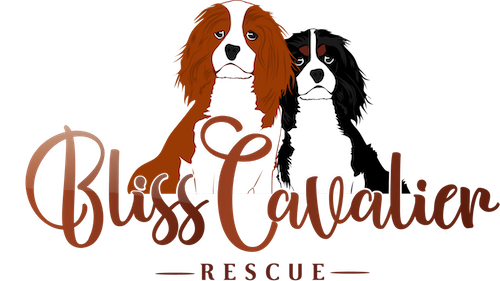Preventing Obesity and Inflammation in Cavalier King Charles Spaniels

MCADD in Cavaliers
23 September 2023
Canine Chiari Malformation and Syringomyelia Treatment Algorithm 2024 – Professor Clare Rusbridge
19 January 2025Obesity in dogs, including Cavalier King Charles Spaniels, is becoming more common and can lead to some very serious health problems, mainly because it causes inflammation. How can extra weight can cause inflammation, and what can you do to help your Cavalier stay healthy?
What is Obesity in Dogs?
Obesity means having too much body fat. Dogs usually experience this because they eat too much. The focus needs to be on food quantity and quality. Due to health issues, some dogs cannot exercise a great deal, but this is not a reason for them to become overweight.
You can tell if your dog is overweight by checking if it has trouble moving around or if its ribs are hard to feel. Your vet will be able to check your dog over and give a BCS (body condition score). This score is graded from 1 to 9, with 9 being the most overweight and 4 being the ideal weight.
We see obesity in Cavaliers far too often. It is completely preventable; we often joke that Cavaliers cannot open the fridge and help themselves.
The dogs in the photograph attached to this article were both grossly obese. Unfortunately, Teddy (on the right) came into rescue 6kg overweight with multiple, extremely painful orthopaedic conditions at just 2 years old. Teddy gets out of breath easily, struggles in warm weather and takes a long time to recover from exercise. He is losing weight well in rescue, and his whole demeanour is changing; he is becoming playful and cheeky, and with every day that passes, he has more energy. He is on pain relief, and this helps him be more mobile and is helping to improve his mental health. On arrival in rescue he looked many years older than his age.
Alfie on the left is also doing fantastically well and is losing weight and feeling the benefits.
Obesity in Cavaliers Impacts Their Mental Health
Much the same as in humans, being overweight as a dog drastically impacts mental health. Obesity often makes it harder for dogs to move around comfortably. This reduced mobility can lead to less physical activity, which is vital for a dog’s mental stimulation and overall happiness. Carrying extra weight can cause fatigue, making dogs less likely to engage in play or exercise. Playtime and physical activity are essential for a dog’s mental health, providing stimulation and a way to expend energy.
Due to their limited mobility and energy levels, obese dogs might be less inclined to interact with other dogs or people. Social interaction is crucial for a dog’s mental well-being, and isolation can lead to feelings of loneliness and depression. Obesity can lead to changes in behaviour, such as increased irritability or anxiety. Dogs that are uncomfortable or in pain due to their weight might become more aggressive or withdrawn.
Impact on Mood and Cognitive Function
Just like humans, dogs can experience depression. The lack of physical activity and social interaction, combined with the discomfort of carrying extra weight, can contribute to a depressed state. You may notice they are sleeping more or quieter than usual. Obese dogs might develop anxiety, especially if they are unable to perform activities they once enjoyed. This can lead to increased stress levels, affecting their overall mental health.
Physical health and mental health are closely linked. Obesity can lead to inflammation and other health issues that may affect brain function, potentially leading to cognitive decline.
Poor Quality Of Life
An obese dog may have a lower quality of life due to the combined physical and mental health challenges. This can manifest in a lack of interest in activities, reduced joy in daily life, and a general sense of lethargy.
How Obesity Leads to Inflammation
- Fat Cells and Inflammation: Fat cells in your dog’s body store extra calories and release substances that can cause inflammation. When a dog becomes obese, these fat cells release more inflammatory substances and fewer anti-inflammatory ones.
- Immune System Response: As the fat cells get bigger, they can start to die off, which attracts immune cells to the fat tissue. These immune cells release even more inflammatory substances, causing a low level of constant inflammation in the body.
- Stress on the Body: Extra weight means more stress on your dog’s body, including their joints and organs. This stress can cause inflammation, making it harder for your dog to move and breathe comfortably.
Problems Caused by Inflammation
- Joint Pain: Inflammation can make conditions like arthritis worse, leading to joint pain and difficulty moving. This is common in overweight dogs, who often develop or have joint problems that become much worse because of the extra weight.
- Diabetes: Inflammation from obesity can lead to insulin resistance, which makes it harder for your dog’s body to regulate blood sugar, potentially leading to diabetes.
- Heart Issues: Chronic inflammation can affect your dog’s heart and blood vessels, increasing the risk of heart disease, which in a Cavalier that is at a very high risk of mitral valve disease already makes the likelihood even higher.
- Neuropathic/Spine Pain: Carrying extra weight will absolutely make commonly suffered Cavalier King Charles health conditions such as chiari malformation, syringomyelia and IVDD a LOT worse.
- Breathing Problems: Extra weight can make breathing harder for your dog, especially if it has a short nose. Inflammation can worsen these respiratory issues, cause sleep apnea, and cause collapse during exercise.
How to Help Your Dog
- Healthy Diet: Feeding your dog a balanced, low-fat, low-calorie diet can help them lose weight. Look for dog food that’s rich in nutrients, and avoid giving treats or table scraps. Weigh every portion of food, and if your Cavalier is still not losing, reduce the amount further. A good guide is to feed 8g of dry food per kilo of target weight per day, split between 2 meals for a non-active dog and 10g per kilo of target weight for an active dog. Weigh your dog weekly.
- Regular Exercise: Ensure your dog gets plenty of exercise, like daily walks and playtime. Exercise helps burn off extra calories and can reduce inflammation. It also helps their mental health in the same way that it does for us too. Provide toys, puzzles, and activities that challenge your dog’s mind. Interactive play can keep them mentally stimulated and happy; it really isn’t about walking miles and miles, especially if they are not used to it. Ensure your dog has plenty of opportunities for social interaction with other dogs and people. Regular play, visits to the park, woods or the beach, and family time are great ways to keep them socially engaged.
- Regular Vet Visits: Take your dog to the vet for regular check-ups. Your vet or vet nurse can help monitor your dog’s weight and provide advice on diet and exercise. Early intervention can prevent or manage obesity-related inflammation and joint and organ damage.
- Supplements and Medication: Sometimes, your vet might recommend supplements or medications to help manage your dog’s weight, e.g., pain relief if your dog struggles with movement. Once your dog is at its target weight, these medications may be reduced or stopped altogether.
By keeping your Cavalier King Charles Spaniel at a healthy weight, you can prevent many of the health issues associated with obesity and inflammation. A healthy diet, regular exercise, and routine vet visits ensure your dog stays happy and healthy. Their mental health must always be considered.




